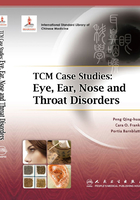
上QQ阅读APP看书,第一时间看更新
CASE STUDY
Female, age 75. Initial Visit: January 5 th, 2009
Chief Complaint: Persistent lacrimation in both eyes for more than two years.
History: The patient had suffered from excess tearing for more than two years, which was initiated by an invasion of external wind in both eyes. She began to tear persistently starting six months prior to treatment. The lacrimation was watery and the symptoms worsened when facing the wind. The vision became blurred when her eyes were tired. The patient visited numerous hospitals and was diagnosed with bilateral epiphora. Washing the lacrimal passage revealed no obstruction and therefore, no treatment was ofered.
Signs and Symptoms: Persistent bilateral lacrimation with watery discharge, exacerbated when facing into the wind, blurred vision upon overuse of the eyes, lower back and knee soreness, moist skin below the inner canthus. The tongue body was pale with a thin white coating. The pulse was thready.
Past History: Hypertension for eight years.
Pattern Differentiation
Tears are the fluid associated with liver, while the kidney governs the entire five fluid systems. The liver and kidney deficiency resulted in a failure to restrain fuids, which subsequently caused the persistent lacrimation with watery discharge The blurred vision upon overuse of the eyes, lower back and knee soreness were symptoms of liver and kidney defciency. Moist skin below the inner canthus was the result of the chronic lacrimation. The pale tongue body and thready pulse were both signs of defciency.
The location of this condition was in the liver and kidney, which failed to restrain fuids. Therefore, this case can be categorized as a defcient patern.
Diagnosis
WM diagnosis: Epiphora
TCM diagnosis: Lacrimation syndrome due to failure of the liver and kidney to restrain fuids
Clinical Treatment
This was a deficiency case. The underlying cause of this case was failure of the liver and kidney to restrain fuids. The treatment principle, therefore, should focus on tonifying the liver and kidney.
Principles: Tonify the liver and kidney, astringe and stop lacrimation
Formula: Modifed Zuŏ Guī Yĭn (Lef-Restoring Beverage)
[左归饮加减]

[Formula Analysis]
Shú dì huáng, huái shān yào and gŏu qĭ zĭ tonify and benefit the liver and kidney and nourish the kidney essence.
Wŭ wèi zĭ, shān zhū yú, bā jĭ tiān and shí liú pí tonify and benefit the liver and kidney to astringe and stop lacrimation.
Due to the aggravation of symptoms by wind, bái jí lí, fáng fēng and jú huā are used to expel wind and stop lacrimation.
Fú líng tonifies the spleen and drains dampness, while also tonifying liver and kidney to prevent the stickiness of the tonifying medicinals.
Gān căo harmonizes the medicinals.
External Therapy
Zinc sulfate eye drops can be applied to the eyes.
Chinese Patent Medicine
Qĭ Jú Dì Huáng Wán (Lycium Berry, Chrysanthemum and Rehmannia Pill), 9g, administered orally, three times per day.
Acupuncture
Main points: BL 18 ( gān shù), BL 23 ( shèn shù), BL 1 ( jīng míng), KI 1 ( yŏng quán)
Supplementary points: LV 3 ( tài chōng), RN 8 ( shén què), LI 4 ( hé gŭ), GB 20 ( fēngchí)
Method: Two main points and 2-3 supplementary points were chosen every day. Alternate the main and supplementary points every other day. 10 days constitutes one course of treatment.
Techniques: Tonifying technique was mainly applied, using both acupuncture and moxa. Moxa to RN 8 ( shén què) was added while needling the following points: BL 18 ( gān shù), BL 23 ( shèn shù), KI 1 ( yŏng quán), LV 3 ( tài chōng). A warm needle was applied to BL 1 ( jīng míng) ipsilaterally.
Further Consultation Second Visit
Afer one course of treatment, all the symptoms were reduced. The tongue body remained pale with a white but slightly greasy coating, and the pulse remained thready. This indicated the correct formula was selected to target the condition, and a similar herbal prescription should be continued. The tongue coating, however, changed from thin white to slightly white and greasy, indicating that rich and sticky medicinals should be avoided in future formulas.
Principles: Tonify and beneft the liver and kidney, astringe and stop lacrimation
Formula: Modified Zuŏ Guī Yĭn (Left-Restoring Beverage).
[Formula analysis]
Based on the frst formula, yì yĭ rén (Semen Coicis) 20g was added to reinforce fúlíng’s function of strengthening the spleen, draining dampness and counteracting the stickiness of the tonifying medicinals.